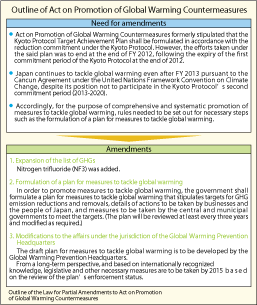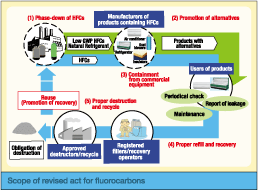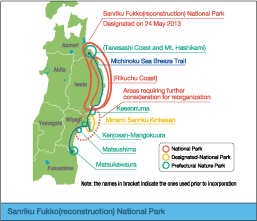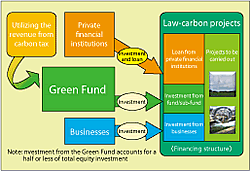Current topics
Act on Promotion of Global Warming Countermeasures Amended
In order to promote measures to tackle global warming in a comprehensive and systematic manner and to achieve targets for GHGs emission reductions and removals beyond 2012, pursuant to the Cancun Agreement under the United Nations Framework Convention on Climate Change, this amendment is intended to promote the formulation of a "plan for measures to tackle global warming" including policies to be implemented at the national and municipal levels, and to take measures to add nitrogen trifluoride (NF3) to the list of targeted gases.
Japan's Revision of Fluorocarbons Legislation
Japan has recently decided to revise the act for fluorocarbons control to fight the rapid increase of HFCs emissions. After the amendment, the act will cover the whole life cycle from production to destruction/ recycle of fluorocarbons. It stipulates the following points:
- - Phase-down of fluorinated gases
- - Promotion of equipment and products with alternative or low GWP gases
- - Containment from commercial equipment in use
- - Introduction of a registration system of fillers/recovery operators of fluorocarbons by the local government
- - Introduction of approval system of destructors/ recyclers of fluorocarbons by the national government
The revised act shall come into force within 2 years of its promulgation. Japan is willing to share its experience of conducting these policies and measures with other countries.
Act on Promotion of Recycling of Small Waste Electrical and Electronic Equipment came into force
- (1) Outline of the Law
- In April 2013, the "Act on Promotion of Recycling of Small Waste Electrical and Electronic Equipment" was enforced, which stipulates the responsibilities of consumers, municipalities, and businesses with a view to effectively using resources contained in small home appliances such as mobile phones and digital cameras, and preventing environmental pollution.
- (2) Recycling flow
- The Law covers more than 100 items of electricity- or battery-powered home appliances, from which each municipality may choose the items they collect. Collected small home appliances will be dismantled and crushed by government-certified business operators, which will then be sorted out by resource type and finally recycled as metal resources.
- (3) Enforcement of the Law
- Each municipality will begin to collect used small home appliances as soon as they are ready for collection.
Sanriku Fukko (reconstruction) National Park Newly Established
The Ministry of the Environment (MOE) has been engaged in the reconstruction of the affected areas through the Green Reconstruction Project focused on establishing the Sanriku Fukko National Park.
On 24 May 2013, the Sanriku Fukko National Park was established, by incorporating Tanesashi Coast in Hachinohe and Mt. Hashikami in Hashikami, both Aomori, into the former Rikuchu Kaigan National Park. A commemoration ceremony was held in Hachinohe to celebrate its designation as a national park, which the Environment Minister Mr. Ishihara attended. Now that the Sanriku Fukko National Park has been launched, we aim to incorporate the Minami Sanriku Kinkasan Quasi- National Park therein by the end of 2014.
As for the development of the "Michinoku Sea Breeze Trail" (a long-distance nature trail) as part of the Green Reconstruction Project, we are currently considering its route with the local people. We are aiming for its partial opening by this autumn. Its entire opening will thereafter be determined by FY 2015.
Joint Crediting Mechanism (JCM)
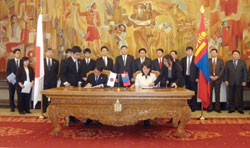
Signing ceremony of the bilateral document with Mongolia, the first signatory country (Ulaanbaatar, 8 January 2013)
Japan is embarking on the full-scale operation of the Joint Crediting Mechanism (JCM) in which Japan facilitates the diffusion of advanced low carbon technologies, products, systems, services, and infrastructures as well as mitigation actions in developing countries. Following an appropriate evaluation of the contribution to GHGs emission reductions or removals in developing countries, Japan will use the generated credits to achieve its emission reduction target.
Japan has signed bilateral documents for the JCM with Mongolia, Bangladesh*, Ethiopia, Kenya, Maldives, Viet Nam, Lao PDR and Indonesia. Participating countries in the JCM are expected to increase as consultations with other developing countries are still underway. (*With Bangladesh, BOCM (Bilateral Offset Credit Mechanism) is used as the name for this mechanism.)
At the COP18 in Doha, Qatar, it was decided to elaborate a "framework" for the implementation of various approaches including the JCM. While continuing its contribution to such institution-building efforts through international negotiations, Japan strives to ensure robust methodologies, transparency, and the environmental integrity in the institutional design of the JCM, and to establish a simple and practical system in line with relevant rules and guidelines.
The JCM is intended to contribute to the ultimate objective of the UNFCCC by fa cilitating global actions for GHGs emission reductions or removals, complementing the CDM.
MORE Information
A Workshop of Intergovernmental Science-Policy Platform on Biodiversity and Ecosystem Services (IPBES) Held
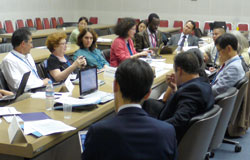
Active discussions were had at three separate working groups.
An expert workshop on the contribution of indigenous and local knowledge systems to IPBES was held at the United Nations University, Tokyo, on 9-11 June 2013. This was the first workshop hosted by the Multidisciplinary Expert Panel (MEP). In its opening ceremony, Kazunori Tanaka, the Parliamentary Senior Vice-Minister of the Environment, gave an opening address.
Green Fund Launched to Accelerate Low-Carbon Investments
In order to achieve a low-carbon society, a huge additional investment is required in the fields of renewal energy and energy saving, and therefore utilization of private capital is essential. In January 2013, the Environment Minister Mr.Ishihara announced the "Finance Initiative to Build a Low-Carbon Society" aimed at utilizing private capital for measures to tackle global warming.
However, local initiatives tend to face the limitations of their funding abilities because low-carbon investments require a large amount of initial investment in project- development and construction. Wind power and geothermal generation projects are also not without problems because they carry great risks in their development phases due to their long lead time for survey and adjustment. Thus, it has been difficult to secure sufficient inflow of private capital in such fields. Despite evolving efforts in terms of large-scale solar power projects, many local initiatives have faced funding shortages at their start-ups.
In this regard, the fund to promote local low-carbon investment (the Green Fund) launched in July 2013 aims to solidify low-carbon projects as a business model, by bolstering its own capital through "equity investment" by attracting private capital including investments and loans from local financial institutions. The fund is planned to focus on projects that contribute not only to reducing CO2 emission but also to activating local communities, such as wind, small scale hydro, and solar power generation projects invested by local companies. Also, the fund will support the project start-up by making investments in its development phases in which no business income is generated. This will overcome the challenges of law-carbon investments and accelerate the realization of law-carbon projects.
The 15th Tripartite Environment Ministers Meeting among Japan, China and Korea (TEMM15) Held in Kitakyushu on 5-6 May.
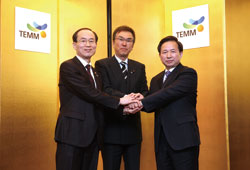
From left, Seongkyu YOON, Minister of the Environment (Korea); Nobuteru ISHIHARA, Minister of the Environment (Japan); Ganjie LI, Vice Minister of Environmental Protection (China)
Main outcome of the meeting
The three ministers expressed their concern over the health impacts caused by air pollution, specifically by PM 2.5 that has drawn a lot of attention even in Japan since the beginning of this year, and agreed to launch the Tripartite Policy Dialogue on Air Pollution. The three countries will strengthen collaboration through this policy dialogue for further tripartite cooperation. The ministers also agreed to promote measures to tackle dust and sandstorms (DSS) and market mechanisms for climate change mitigation.
Side events etc.
In advance of the plenary meeting, Japan held bilateral talks with each of Korea and China. As side events, we also held the Business Forum where business representatives from the three countries gathered to discuss "expanding environmental market" and the Youth Forum where young people actively exchanged their views on "environmentally sustainable cities." Moreover, the award ceremony by the three ministers was for the first time held to commend individuals who contributed to environmental cooperation among the three countries. From Japan, Dr. Hajime Akimoto of Japan Environmental Sanitation Center was presented the award this year.
In addition, the amount of GHGs emitted by this Ministerial meeting has been offset by the J-VER (offset credits) scheme that was born out of the efforts to tackle global warming in Miyagi Prefecture, the disaster-affected area.
Future schedule
Next TEMM16 is planned to be held in Korea in 2014.
Participation in the 2nd Asia-Pacific Water Summit and Organization of the WEPA Technical Workshop
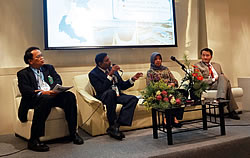
Panel discussion at WEPA Technical Workshop
The 2nd Asia-Pacific Water Summit and the Chiang Mai Declaration
On 19-20th May, the 2nd Asia-Pacific Water Summit was held in Chiang Mai, Thailand, under the main theme of "Water Security and Water-related Disaster Challenges: Leadership and Commitment," attended by summit- and ministerial-level participants from Asia-Pacific countries, and representatives of international organizations.
The "Chiang Mai Declaration," as adopted at the closing ceremony of the meeting: recognized the importance of water and sanitation as global challenges; referred to natural disaster preparedness, water resources security, and water pollution reduction; and declared to encourage appropriate consideration of water issues in the discussion of the United Nations Post 2015 Development Agenda.
Participation of Japanese delegation in the Summit and Organization of the WEPA Technical Workshop
Mr. Yoshiro Mori, President of Asia-Pacific Water Forum (Former Prime Minister of Japan) participated in the summit as the organizer, and various concerned government officials and others participated in the summit including the pre-events. On 17th May, MOE of Japan organized a technical workshop under the name of WEPA (Water Environment Partnership in Asia, a partnership aiming to improve water environment governance in cooperation with 13 Asian countries). In the workshop under the heading of "Voice from Asia for Better Water Quality - for Discussion toward Post-2015 Development Goals on Water" the importance of further cooperation among the countries concerned towards improving water environment of Asian region was recognized through the discussions among the participants.


